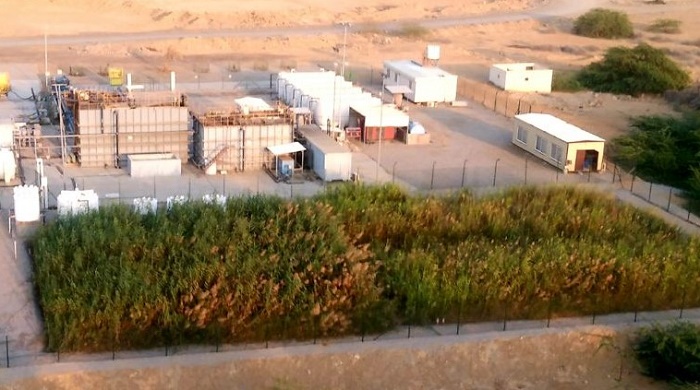
Muscat: An environment-friendly process to treat and recycle wastewater in Oman has won an award from the Ministry of Higher Education, Research and Innovation.
The process involves a wetland system consisting of locally sourced gravel, sand, and reeds to treat wastewater by natural methods so that it can be repurposed for irrigation.
Built on an area spanning 995 square metres in the premises of the wastewater treatment plant in Quriyat, the system was designed for Omani climatic conditions, using no mechanical parts.
The treatment system was designed by Buthaina Al Wahaibi, Mahad Baawain, Dr Alexandros Stefanakis, Dr Tahereh Jafary, Dr Mortaza Aghbashli, Dr Meisam Tabatabei and Dr Abdullah Al Mamun, for which they were awarded the Annual Research Award for 2021 in the category of Best Published Research Led by a Young Researcher (non-PhD holder) in the Environment and Biological Resources Sector.
Dr Alexandros Stefanakis, who worked on the project, and is employed as an assistant professor at the Technical University of Crete in Greece, explained the increasing need to focus on more and more environmentally sustainable solutions.
“It is only now that we realise the magnitude of the global environmental problems and their impact,” said Stefanakis, who is also a Climate Pact Ambassador for the European Commission. “For decades – or even centuries – economic growth followed the so-called linear model of ‘take-make-consume-waste’, which is based on the continuous extraction of natural resources and the subsequent creation of products, and eventually waste.
“This process resulted in environmental issues we are all aware of, from climate change and global warming, to local water and soil pollution,” he added. “However, we know now that natural resources are limited and eventually will be depleted if we continue with this thoughtless extraction, while the international scientific community continues to warn (us) about the irreversible impact of our actions, if we don’t respond now.
“This is the trigger and the motivation to adopt sustainable principles and practices and move to a different model of economic growth: that of a circular economy, where treated water or solid waste is viewed as a new resource, and where green technologies are developed to minimise environmental impact. And this is why nature-based solutions, such as the one studied in this research project, perfectly achieve this goal.”
The water treatment project in Quriyat was done for Haya Water, in collaboration with The Research Council Fund, and Sultan Qaboos University. Seen as a cost-effective solution that has environmental as well as economic benefits, the green wastewater treatment plant is one that can be used on a small, as well as large-scale, and requires minimum operation and maintenance.
Until about two years ago, Stefanakis was employed in Oman, working as an engineer specialising in constructed wetlands, implementing green projects for sustainable waste management in the region. He is currently working on a host of other environmental projects around the world, including eight research studies across Africa, Europe and the US.
He is also overseeing three wetlands projects in Saudi Arabia, Qatar and Iran. In Brazil, one of the largest systems is under construction for sustainable treatment of wastewater from mines. In Lebanon, he is involved in building another full-scale wetland system, while in Egypt, he just completed a project involving the cleanup of a polluted river using natural solutions.
“If we continue to follow unsustainable growth models, the consequences will be devastating,” explained Stefanakis. “We can already observe rise in global temperature, increasing frequency and intensity of catastrophic events and extreme weather phenomena, and a decrease in ice cover in the Arctic. All these global issues are also expressed at national and local levels across the world. We can all understand the effects of these phenomena on society, our health and our ecosystems. Of course, we can imagine the major impact this will have on our economies.
“I believe that although many countries are doing a lot, we are not doing all that is necessary,” he admitted. “Although there are many suggestions, initiatives and guidelines by international organisations, the adoption rate of these practices is not very satisfying. The climate crisis has now reached a point where we do not have time to waste. There is strong scientific evidence that this decade will be a decisive one in terms of whether we will reach the targets set by the Paris Agreement.
“This means that we should transform and decarbonise our economies much faster than we are doing it right now,” he added.
“Of course, this is not an easy process. But, the future of our children depends on our actions today.”